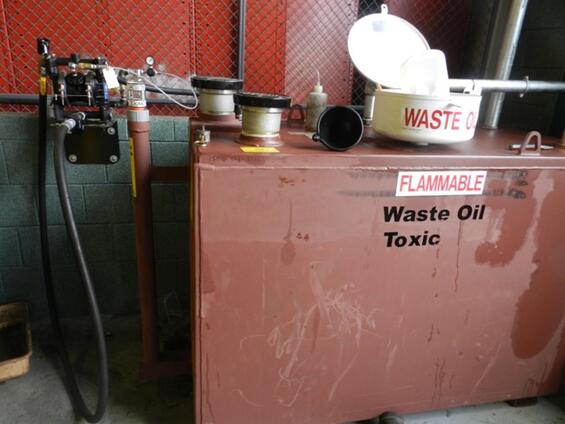MassDEP Waste Oil Regulations
Generator Status
All shops that generate waste oil must register with MassDEP and include the quantity of waste oil produced when notifying MassDEP of total waste oil generation. Shops may have a separate generator status for hazardous waste and waste oil based on the accumulation of each. However, the following are the generation limits for all three waste oil categories that you must follow:
- Very Small Quantity Generator (VSQG):
- These businesses generate less than 220lbs (approximately 27 gallons) of waste oil per month. VSQGs can also transport waste oil to another business or location for use in a waste oil heater. See below for more information.
- Small Quantity Generator (SQG):
- These businesses generate between 220lbs to 2,200lbs (or approximately 27 and 270 gallons) of waste oil per month.
- Large Quantity Generator (LQG):
- These businesses produce more than 2,200lbs or (approximately 270 gallons) of waste oil per month.
Storage
The area in your shop that is designated for the storage of waste oil must be marked, in letters at least one inch high, with “Waste Oil.” Generators of waste oil must comply with the same containment requirements as other producers of hazardous waste. Do not mix waste oil with other types of hazardous waste. Keep the drums away from electrical areas.
Spills
If the spill occurs near coastal waters or storm drains, call the National Response Center at 1-800-424-8802. Call 911 to report all spills to nearest fire department. Also, if a spill occurs, your shop is required to report any amount beyond 10 gallons of oil immediately to MassDEP at 1-888-304-1133. There is a penalty for failing to report this to MassDEP within 24 hours.
Waste Oil Collection
Allow used oil filters to drain completely for at least 12 hours after removing them from the vehicle. See the “Oil Filter Can Crushers” page for more information on a mechanized way to collect oil from oil filters. Oily rags are also considered hazardous waste as long as they pass the “one-drop test” and no longer drip oil.
To capture oil from vehicles during maintenance, there are several methods ranging from drip pans to “Vehicle Fluid Evacuation Caddies” (see fact sheet).
Waste Oil Heaters
If your shop can make use of the waste oil collected from vehicles, this can save money on energy during the winter. VSQGs can also transport the waste oil to another site for use in a heater. If your shop intends to burn waste oil for heat, submit an On-Site Class A Recycling Notification to MassDEP.
Also, shops that burn waste oil as heat must follow the following regulations
- Burn waste oil only between September 15th and June 15th.
- Burn or transport at least 75 percent of all waste oil accumulated onsite during the same calendar year (therefore, keep logs of the waste oil generated, transported, and received).
- Never modify space heaters.
If your VSQG shop transfers waste oil to another location that burns it, you must maintain transport logs that document the dates, quantities transferred, the receiving location’s name, address, and hazardous waste generator number, and signatures of receipt for each instance. According to the MassDEP regulations for VSQGs, transport only one 55 gallon drum at one time.

Pictured here: a waste oil management system using a waste oil storage tank, above, filled using a waste oil collection caddy. The oil is emptied from the caddy using a hookup. This waste oil storage tank is close to an outside wall, allowing the pick-up company to empty the tank through the wall. If your shop considers this method, be sure to obtain the correct receipts from the pick-up company if they operate outside your shop's business hours. Note that waste oil containers and funnels must always be closed when oil is not being actively deposited.
Find Additional Information
Follow the guidelines of these MassDEP fact sheets:
Contact
Phone
You will be connected to the person who can best answer your questions.